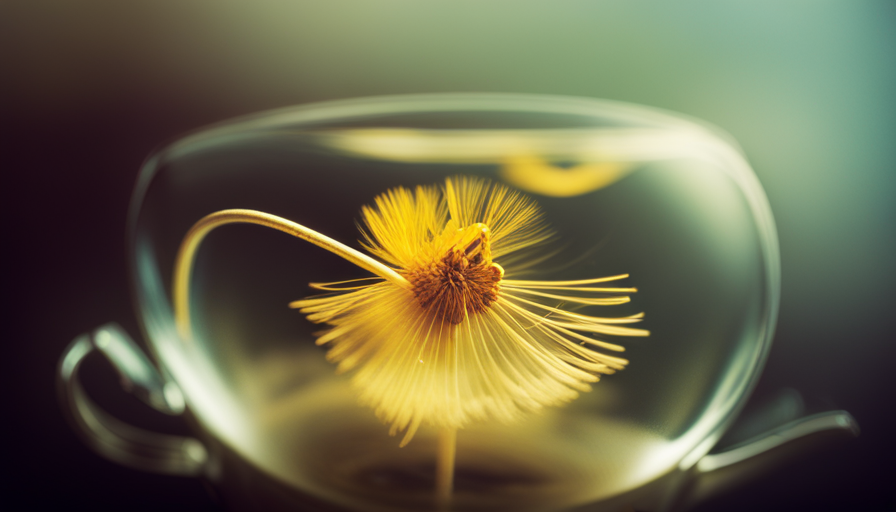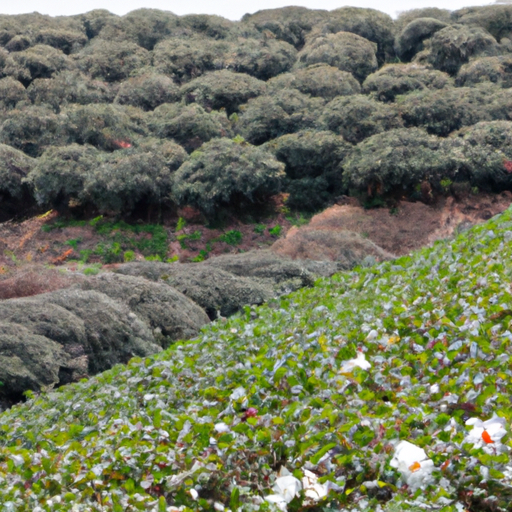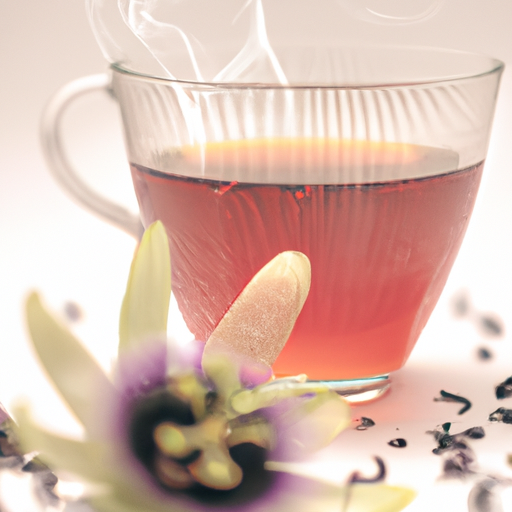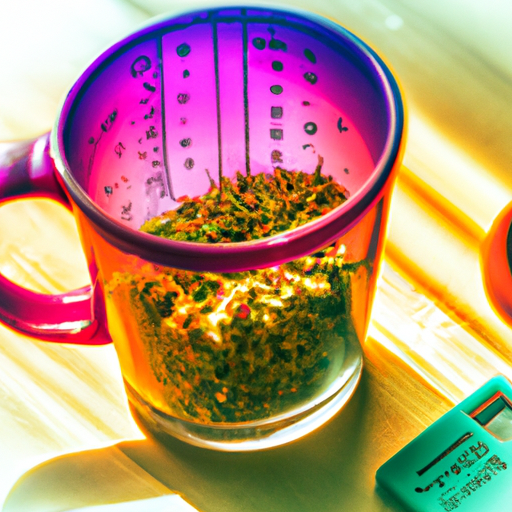Picture a lively field filled with dandelions, their bright yellow petals dancing gently in the wind. Although some may consider dandelions as bothersome weeds, I see them as valuable gifts from nature, brimming with health advantages and a distinctive taste profile.
In this article, I will guide you through the process of making dandelion flower tea, a delightful beverage that not only tantalizes your taste buds but also supports your overall well-being.
Did you know that dandelion flowers have been used for centuries in traditional medicine? They are rich in vitamins A, C, and K, as well as essential minerals like iron and calcium. Additionally, dandelion flower tea is believed to aid digestion, support liver function, and promote healthy skin. With all these incredible benefits, it’s no wonder that dandelion flower tea has gained popularity among health enthusiasts.
Join me as we dive into the fascinating world of dandelion flower tea. From gathering and preparing the flowers to brewing the perfect cup, I will share my knowledge and expertise to help you embrace the health and flavor of this delightful beverage.
So, let’s get started on this botanical journey and unlock the secrets of dandelion flower tea together.
Key Takeaways
- Dandelion flower tea is beneficial for digestion, liver function, and skin health.
- It is rich in vitamins A, C, and K, as well as essential minerals.
- Dandelion flower tea acts as a natural diuretic and aids in detoxification.
- It contains antioxidants that combat inflammation and strengthen the immune system.
Introduction to Dandelion Flower Tea
Get ready to discover the delightful world of dandelion flower tea! Dandelion, scientifically known as Taraxacum officinale, is a vibrant yellow flower that’s been used for centuries due to its numerous health benefits.
Native to Europe and Asia, dandelion flower tea has a rich history that dates back to ancient times.
The dandelion flower is not just a common weed in your backyard; it’s a powerhouse of nutrients. Packed with vitamins A, C, and K, as well as minerals like iron and potassium, dandelion flower tea is a great addition to a healthy diet. Additionally, it contains flavonoids and antioxidants that help fight oxidative stress and inflammation in the body.
The history of dandelion flower tea is fascinating. It’s been used for centuries in traditional medicine systems, such as Ayurveda and Traditional Chinese Medicine, to support liver health, aid digestion, and promote overall well-being. Dandelion flower tea was also commonly consumed as a natural diuretic and detoxifying agent.
As we explore the benefits of dandelion flower tea in the next section, you’ll discover how this humble flower can positively impact your health and well-being. So, let’s dive into the incredible benefits of dandelion flower tea and how it can enhance your daily routine.
Benefits of Dandelion Flower Tea
Discover the incredible advantages of indulging in this enchanting infusion, as it nourishes your body and uplifts your spirits. Dandelion flower tea isn’t just a delightful beverage; it also boasts an array of health benefits and medicinal properties. Here are four reasons why you should embrace this herbal concoction:
-
Detoxification: Dandelion flower tea acts as a natural diuretic, promoting the elimination of toxins from your body. It aids in flushing out harmful substances and supports liver health, making it an excellent choice for detoxifying your system.
-
Digestive Aid: This tea stimulates digestion and helps relieve common digestive issues like bloating and constipation. It increases bile production, which aids in breaking down fats and improving nutrient absorption.
-
Anti-inflammatory Properties: Dandelion flower tea contains potent antioxidants that combat inflammation in the body. Regular consumption can help reduce inflammation-related conditions like arthritis and improve overall joint health.
-
Immune Boost: Packed with essential nutrients like vitamin C and antioxidants, dandelion flower tea strengthens the immune system, protecting against common illnesses and infections.
By now, you must be eager to start reaping the benefits of dandelion flower tea. The next section will guide you through the process of gathering and preparing dandelion flowers for a delightful cup of tea.
Gathering and Preparing Dandelion Flowers
Indulge in the enchanting process of gathering and preparing these vibrant yellow blossoms to create a delightful cup of herbal infusion. When gathering dandelion flowers, it’s crucial to select them from an area that’s free from pesticides and pollution. Look for flowers that are fully open and haven’t yet started to wilt. Gently pluck the flowers from the stem, being careful not to damage the delicate petals.
Not only are dandelion flowers visually appealing, but they also offer numerous health benefits. They’re rich in antioxidants, which help protect the body from harmful free radicals. They also contain vitamins A and C, as well as minerals like potassium and calcium, which support overall well-being. By incorporating dandelion flower tea into your routine, you can boost your immune system and promote healthy digestion.
Transitioning into the subsequent section about drying and storing dandelion flowers, it’s important to preserve their vibrant qualities. Once you’ve gathered a sufficient amount of flowers, it’s time to dry and store them for future use. This process involves carefully laying the flowers on a clean, dry surface and allowing them to air dry for several days.
Stay tuned to learn how to properly dry and store these remarkable flowers for continued enjoyment.
Drying and Storing Dandelion Flowers
After carefully plucking the dandelion flowers, it’s imperative to properly dry and store them to maintain their vibrant qualities for future use. Drying the flowers is a crucial step in the process of making dandelion flower tea.
There are several drying techniques that can be employed to ensure the preservation of the flowers’ flavor and medicinal properties.
One effective method is air drying. To do this, simply spread the dandelion flowers in a single layer on a clean and dry surface, such as a baking sheet or a wire rack. Place them in a well-ventilated area away from direct sunlight, as exposure to sunlight can cause the flowers to lose their vibrant color. Allow the flowers to air dry for about a week or until they become brittle and break easily when touched.
Another option is using a food dehydrator. This method offers a quicker drying process. Spread the plucked dandelion flowers on the trays of the dehydrator, making sure they are evenly spaced. Set the dehydrator to a low temperature, around 95 degrees Fahrenheit, and let it run for approximately 8 to 12 hours. Check the flowers regularly to ensure they are drying evenly and not becoming too crisp.
Once the dandelion flowers are completely dry, it’s important to store them properly to maintain their freshness. Place the dried flowers in an airtight container, such as a glass jar or a resealable bag. Store the container in a cool, dark, and dry place, as exposure to light, heat, and moisture can cause the flowers to lose their potency. Properly stored dandelion flowers can last up to a year.
Now that the dandelion flowers are dried and stored, it’s time to move on to the next step: brewing dandelion flower tea.
Brewing Dandelion Flower Tea
To enjoy a delightful cup of dandelion flower tea, begin by steeping the dried flowers in hot water for a few minutes. This simple brewing technique allows the flavors and health benefits of the dandelion flowers to infuse into the water, creating a soothing and beneficial beverage.
Here are some important steps to follow when brewing dandelion flower tea:
-
Boil water in a kettle or pot until it reaches a temperature of around 200°F (93°C). This temperature is ideal for extracting the flavors and beneficial compounds from the dandelion flowers.
-
Place a handful of dried dandelion flowers into a tea infuser or a cloth bag. This’ll prevent any loose petals or debris from getting into your tea.
-
Pour the hot water over the dandelion flowers and let them steep for 3-5 minutes. You can adjust the steeping time based on your personal preference for a stronger or milder flavor.
-
Once the steeping time is complete, remove the infuser or bag and discard the used flowers.
-
Transitioning into the subsequent section about adding flavors and enhancements, it’s time to explore the various ways you can enhance the taste of your dandelion flower tea.
By following these simple brewing techniques, you can create a flavorful and nourishing cup of dandelion flower tea.
Adding Flavors and Enhancements
After brewing a refreshing cup of dandelion flower tea, it’s time to take it up a notch by exploring the world of flavors and enhancements. Adding different elements to your tea can not only enhance its taste but also provide additional health benefits.
Flavored tea is a delightful way to enjoy the natural goodness of dandelion flowers while indulging your taste buds.
One popular option is to infuse your dandelion flower tea with a hint of citrus. Squeeze some fresh lemon or orange juice into your cup, or even add a slice of lemon for a tangy twist. The citrusy notes complement the earthy flavor of the dandelion flowers beautifully.
For those who prefer a sweeter taste, a touch of honey or a sprinkle of cinnamon can do wonders. Honey lends a natural sweetness while cinnamon adds a warm, aromatic flavor that pairs perfectly with dandelion flower tea.
Not only do these flavor additions enhance the taste, but they also bring their own set of health benefits. Citrus fruits are packed with vitamin C, honey has antibacterial properties, and cinnamon is known for its anti-inflammatory effects.
Now that we’ve explored the various flavors and enhancements, it’s time to move on to the next step – serving and enjoying our delightful dandelion flower tea.
Serving and Enjoying Dandelion Flower Tea
Now that you’ve brewed a delightful cup of dandelion flower tea, it’s time to savor the moment by serving and enjoying it in your favorite cozy mug. But before we delve into the serving techniques, let’s quickly recap the incredible health benefits of dandelion flower tea. This herbal infusion is rich in antioxidants, vitamins, and minerals, making it a powerful detoxifier and immune booster. It aids digestion, promotes liver health, and can even alleviate inflammation and bloating.
To serve your dandelion flower tea, presentation is key. Imagine yourself in a serene tea room, with soft music playing in the background. As you pour the tea into your mug, the aroma of the delicate flowers envelops your senses. To enhance the experience, consider using a three-column and five-row table to organize your tea service. Place a dainty teapot in the center, accompanied by a plate of freshly baked scones and a jar of honey. On the other side, have a small dish of lemon slices and a delicate china cup and saucer.
As you take that first sip of the warm, floral-infused tea, you can’t help but appreciate the soothing flavor and the comfort it brings. The health benefits of dandelion flower tea only add to the enjoyment, knowing that each sip is supporting your well-being. So go ahead, indulge in this delightful tea and let its nourishing properties enhance your day. Transitioning into the next section about ‘other uses for dandelion flowers,’ there are even more ways to incorporate the versatility of these blooms into your life.
Other Uses for Dandelion Flowers
Amidst a tapestry of possibilities, dandelion flowers reveal their versatility, offering an array of creative uses beyond the realm of tea. These vibrant yellow blossoms can be transformed into delightful culinary delights and powerful natural remedies. Let me share with you three captivating ways to incorporate dandelion flowers into your cooking recipes and health routines.
-
Culinary Delights: Dandelion flower fritters are a delicious treat that combines the delicate flavor of the flowers with a crispy batter. Simply dip the flowers in a mixture of flour, milk, and eggs before frying them to golden perfection. The result is a delightful appetizer or dessert that’ll leave your taste buds craving for more.
-
Healing Tonics: Dandelion flower-infused oil can be used topically to soothe skin irritations and promote healing. By infusing the flowers in a carrier oil, such as olive or coconut oil, their therapeutic properties are extracted. This natural remedy can be applied to minor cuts, bruises, and even insect bites.
-
Medicinal Tea: Dandelion flower tea, as we discussed earlier, offers numerous health benefits. It aids in digestion, detoxification, and even acts as a diuretic. By incorporating the flowers into your tea routine, you can reap the rewards of its potent medicinal properties.
As we explore the various uses of dandelion flowers, it’s important to consider safety precautions and considerations.
Safety Precautions and Considerations
Before incorporating dandelion flowers into your culinary creations or health routines, it’s crucial to be aware of safety precautions and considerations.
While dandelion flowers are generally safe for consumption, it’s important to take certain measures to prevent allergies and potential side effects.
Firstly, it’s recommended to start with a small amount of dandelion flower tea to test for any allergic reactions. Some individuals may experience allergic responses such as skin rashes or respiratory issues. If you have a known allergy to plants in the Asteraceae family, which includes daisies and ragweed, it’s advisable to avoid dandelion flowers altogether.
Additionally, dandelion flowers have diuretic properties, which means they can increase urine production. This can be beneficial for individuals with certain health conditions, such as edema or high blood pressure. However, excessive consumption of dandelion flower tea may lead to dehydration or electrolyte imbalances. It’s important to drink plenty of water and maintain a balanced diet while incorporating this tea into your routine.
Embracing the health and flavor of dandelion flower tea can be a delightful addition to your lifestyle. However, it’s essential to be aware of safety precautions and consider any potential side effects. By being cautious and starting with small amounts, you can enjoy the benefits of this herbal infusion without any adverse reactions.
Transitioning into the next section, let’s explore the numerous reasons why dandelion flower tea is a wonderful choice for your health and palate.
Conclusion: Embrace the Health and Flavor of Dandelion Flower Tea
As you savor the delicious and nutritious benefits of dandelion flower tea, you’ll discover a delightful addition to your health and palate. Dandelion flower tea not only offers a unique flavor but also provides numerous health benefits. This herbal tea is packed with essential vitamins and minerals, including vitamins A, C, and K, as well as calcium, iron, and potassium. These nutrients contribute to a healthy immune system, strong bones, and improved digestion. Moreover, dandelion flower tea is known for its detoxifying properties, helping to cleanse the liver and kidneys by flushing out toxins from the body.
To further illustrate the health benefits of dandelion flower tea, let’s take a look at the following table:
| Health Benefits of Dandelion Flower Tea |
|---|
| Boosts immune system |
| Supports bone health |
| Improves digestion |
| Detoxifies the liver and kidneys |
| Provides essential vitamins and minerals |
In addition to its health benefits, dandelion flower tea offers a unique flavor profile. Its slightly bitter taste is balanced with a subtle sweetness, making it a refreshing and enjoyable beverage. The floral notes add a pleasant aroma, enhancing the overall sensory experience. Whether you prefer it hot or chilled, dandelion flower tea is a versatile and invigorating drink that can be enjoyed throughout the year. Embrace the health benefits and unique flavor of dandelion flower tea, and elevate your tea-drinking experience to new heights.
Frequently Asked Questions
Can dandelion flower tea be made with other parts of the dandelion plant, such as the leaves or roots?
Yes, dandelion leaves can be used in tea. They’re rich in nutrients like vitamin C, vitamin A, and iron. Dandelion root tea, on the other hand, offers various benefits. It’s known to support liver health, aid digestion, and act as a natural diuretic. The root contains antioxidants and compounds that may have anti-inflammatory properties. Both the leaves and root can be used to make a flavorful and beneficial tea.
Are there any potential side effects or interactions with medications when consuming dandelion flower tea?
Potential drug interactions and adverse effects should be considered when consuming dandelion flower tea. It’s like navigating a delicate dance with your medications.
Dandelion may interact with certain drugs, affecting their effectiveness or causing unwanted side effects. Additionally, some individuals may experience adverse effects such as allergic reactions, digestive issues, or skin irritation.
It’s crucial to consult with a healthcare professional before incorporating dandelion flower tea into your routine to ensure safety and avoid any potential complications.
How long does it take for dandelion flowers to dry completely?
Drying time for dandelion flowers depends on various factors like humidity, temperature, and air circulation. Typically, it takes about 1-2 weeks for dandelion flowers to dry completely.
To preserve freshness, it’s crucial to ensure proper airflow and avoid moisture buildup during the drying process. Hanging the flowers upside down in a well-ventilated area with low humidity is recommended.
Once dried, the flowers can be stored in airtight containers away from light and moisture to maintain their quality.
Can dandelion flower tea be made using fresh flowers instead of dried ones?
Using fresh dandelion flowers instead of dried ones to make dandelion flower tea is possible. While dried flowers are commonly used, fresh flowers can also be used to make a delicious and nutritious tea.
Fresh flowers have a more vibrant flavor and contain higher levels of antioxidants, vitamins, and minerals. They provide a burst of freshness and vitality to the tea, enhancing its overall taste and health benefits.
Are there any specific recommendations for the best time of day to enjoy dandelion flower tea for maximum benefits?
The best time to drink dandelion flower tea for maximum benefits is in the morning or midday. This allows the body to fully absorb the nutrients and take advantage of its health benefits.
Dandelion flower tea is rich in antioxidants, vitamins, and minerals, which can support digestion, liver function, and detoxification. Its diuretic properties may also aid in reducing water retention and promoting urinary health. Regular consumption can contribute to overall well-being.
Conclusion
In conclusion, embracing the health and flavor of dandelion flower tea is a wise choice. As I sipped on a warm cup of this delightful brew, I couldn’t help but marvel at the immense benefits it offers.
With its rich antioxidants and potential to aid digestion, dandelion flower tea is like a superhero for our bodies. Just like how the dandelion flower spreads its seeds far and wide, let this tea spread its healing properties within you.
So go ahead, embrace the power of dandelion flower tea and nourish your mind, body, and soul.










